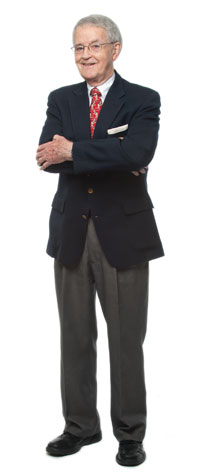 Leo Sweeney and The Sweeney Family
Leo Sweeney and The Sweeney Family
Legacy Award
What does it mean when you have 18 alumni, 25 degrees and a UMKC leader in your family tree? It means that you are both the history and the future of the university. The Sweeney legacy began with Leo Sweeney’s graduation from the University of Kansas City (now UMKC) in 1951 and his 51-year career as UKC/UMKC’s director of admissions and registrar, assistant vice chancellor and senior consultant for International Student Affairs. All four of Leo and Annabelle Sweeney’s children and their spouses, plus other relatives, have followed the Roo tradition of graduating from UMKC. They hold degrees from the College of Arts & Sciences, the Conservatory, the Bloch School and the schools of Biological Sciences, Law, Education and Medicine.
With family members involved in fields ranging from banking to cardiology to hospitality, there is no Sweeney “family business.” How did a group with such wide-ranging interests all end up at the same university?
Annabelle was one of five children in the Pecoraro family, and we were one of the first two marriages, so by 1951, when I graduated from UKC, we were the patriarch family. When I came back in 1957 to be director of admissions and registrar, that caused a lot of focus on me as the source of advice on admissions, career options, financial aid, etc. for members of the family. In the process, I was able to bring out that UKC and UMKC had a wide scope of majors and minors and degrees that might otherwise have been overlooked by some of the younger people.
If there is a common thread in the family biography, it’s success and leadership. What drives or accounts for that?
They were all in strong families. They were encouraged to succeed in whatever they did. The closeness of the families, the support from them, was close at hand while they could remain in greater Kansas City while they studied. The record will show most of them worked part time while going to the university, they didn’t end up with college debt, they were ready to go out into the world when they graduated, and many ended up with offers during the last part of their degree work.
Successful families must be there to really give strong support to have a consistent pattern of successful people. I have been very proud of them all in the broadest sense, as persons, not simply because they have had career success.
Over the course of 51 years working in higher education, you’ve seen a lot of changes. What are the constants – the practices, values or attitudes that endure?
One of the things I was most proud of at UMKC was the second chances that students who stumbled at first could have. Time and again, I dealt with students who had stumbled, even some who had been valedictorians in high school but had started at institutions that were not good matches for them, but ended up as honor students with us. That’s unlike so many other countries, even today.
So many faculty are willing to teach and do research even though other careers might be more lucrative. I encountered many such people during my time at UMKC, who could have been working for double or triple what they were making, but were at UMKC because that was what they wanted to do.
One of things I have been most pleased about that has endured is the interest in international education – study abroad by U.S. students and meaningful involvement of international students and scholars from all over the world coming to U.S. institutions, including UMKC. One of the reasons I got very active in international education at UMKC is because I sensed that if our students were going to have real exposure to the world, we had to bring some of the world to them. That was my goal when we started international student affairs office.
